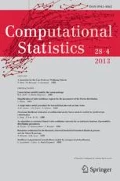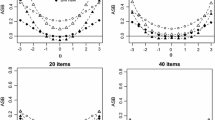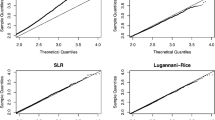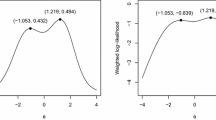Abstract
Asymptotic approximations to the distributions of the ability estimator and its transformations in item response theory are derived beyond the usual normal one when associated item parameters are given as in tailored testing. For the approximations, the asymptotic cumulants of the estimators up to the fourth order with the higher-order asymptotic variances are obtained under possible model misspecification. For testing and interval estimation of abilities, the asymptotic cumulants of the pivots studentized in four ways are derived. Numerical examples with simulations including those for confidence intervals for abilities are given using the three-parameter logistic model.
Similar content being viewed by others
References
Amari S (1985) Differential-geometrical methods in statistics. Lecture notes in statistics, vol 28. Springer, New York
Baker FB, Kim SH (2004) Item response theory-parameter estimation techniques, 2nd edn. Dekker, New York
Bartlett MS (1953a) Approximate confidence intervals. Biometrika 40: 12–19
Bartlett MS (1953b) Approximate confidence intervals II. More than one unknown parameter. Biometrika 40: 306–317
Barton MA, Lord FM (1981) An upper asymptote for the three-parameter logistic item-response model (Research report 81-20). Educational Testing Service, Princeton
Bock RD, Aitkin M (1981) Marginal maximum likelihood estimation of item parameters: application of an EM algorithm. Psychometrika 46: 443–459
Bock RD, Lieberman M (1970) Fitting a response model for n dichotomously scored items. Psychometrika 35: 179–197
Bock RD, Moustaki I (2007) Item response theory in a general framework. In: Rao CR, Sinharay S (eds) Handbook of statistics, Vol. 26. Psychometrics. Elsevier, New York, pp 469–513
Clopper CJ, Pearson ES (1934) The use of confidence or fiducial limits illustrated in the case of the binomial. Biometrika 26: 404–413
Ferguson H (1992) Asymptotic properties of a conditional maximum-likelihood estimator. Can J Stat 20: 63–75
Haberman SJ (1977) Maximum likelihood estimates in exponential response models. Ann Stat 5: 815–841
Hall P (1992a) The bootstrap and Edgeworth expansion. Springer, New York. Corrected printing, 1997
Hall P (1992b) On the removal of skewness by transformation. J Royal Stat Soc B 54: 221–228
Hambleton RK (1989) Principles and selected applications of item response theory. In: Linn RL (ed) Educational measurement, 3rd edn. Macmillan, New York, pp 147–200
Klauer KC (1991) Exact and best confidence intervals for the ability parameter of the Rasch model. Psychometrika 56: 535–547
Kolen MJ, Brennan RL (2004) Test equating, scaling, and linking: methods and practices, 2nd edn. Springer, New York
Lawley DN (1956) A general method for approximating to the distribution of likelihood ratio criteria. Biometrika 43: 295–303
Lord FM (1975) Evaluation with artificial data of a procedure for estimating ability and item characteristic curve parameters. (Research Bulletin 75-33). Educational Testing Service, Princeton
Lord FM (1980) Applications of item response theory to practical testing problems. Erlbaum, Hillsdale
Lord FM (1983) Unbiased estimators of ability parameters, of their variance, and of their parallel-forms reliability. Psychometrika 48: 233–245
Lord FM, Novick MR (1968) Statistical theories of mental test scores. Addison-Wesley, Reading
McCullagh P (1987) Tensor methods in statistics. Chapman & Hall, London
Ogasawara H (2009) Asymptotic cumulants of the parameter estimators in item response theory. Computational Statistics 24: 313–331
Ogasawara H (2010) Asymptotic expansions for the pivots using log-likelihood derivatives with an application in item response theory. J Multivar Anal 101: 2149–2167
Ogasawara H (2012a) Cornish–Fisher expansions using sample cumulants and monotonic transformations. J Multivar Anal 103: 1–18
Ogasawara H (2012b) Supplement to the paper “Asymptotic expansions for the ability estimator in item response theory”. Econ Rev (Otaru University of Commerce). http://www.res.otaru-uc.ac.jp/~hogasa/, http://barrel.ih.otaru-uc.ac.jp/ (to appear)
Stafford JE (1992) Symbolic computation and the comparison of traditional and robust test statistics. Unpublished doctoral dissertation, University of Toronto, Canada
Taniguchi M, Watanabe Y (1994) Statistical analysis of curved probability densities. J Multivar Anal 48: 228–248
Trachtenberg FL (2000) Contribution to estimation in item response theory. Unpublished doctoral dissertation, University of Illinois at Urbana-Champaign, Urbana, IL
Viraswami K, Reid N (1996) Higher-order asymptotics under model misspecification. Can J Stat 24: 263–278
Author information
Authors and Affiliations
Corresponding author
Additional information
This work was partially supported by a Grant-in-Aid for Scientific Research from the Japanese Ministry of Education, Culture, Sports, Science and Technology No.20500341.
Rights and permissions
About this article
Cite this article
Ogasawara, H. Asymptotic expansions for the ability estimator in item response theory. Comput Stat 27, 661–683 (2012). https://doi.org/10.1007/s00180-011-0282-0
Received:
Accepted:
Published:
Issue Date:
DOI: https://doi.org/10.1007/s00180-011-0282-0




